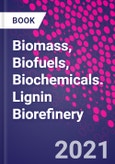Biomass, Biofuels, Biochemicals: Lignin Biorefinery discusses the scientific and technical information relating to the structure and physico-chemical characteristics of lignin. The book covers the different processes (biological, thermal and catalytic routes) available for lignin conversion into specialty chemicals or fuels, activity relationships, and how optimized process parameters help establish the feasible size of the commercial plant in a centralized or decentralized model. In addition, the advantages and limitations of different technologies are discussed, considering local energy, chemicals, biopolymers, drug intermediates, activated carbons, and much more.
Please Note: This is an On Demand product, delivery may take up to 11 working days after payment has been received.
Table of Contents
I General
1. Lignin: A versatile polymer
a. Availability of lignin
b. Types of lignin
2. Chemistry of lignin from pulp and paper industry
3. Chemistry of lignin from ethanol industry
4. Lignin from other sources
II Lignin Biorefineries/Lignin Valorization
5. Biological lignin decomposition
6. Enzymatic degradation of selective bonds in lignin
7. Aerobic and anaerobic pathways for lignin degradation
8. Systems biology approaches for lignin conversion
9. One-pot reactions with lignin model compounds
10. Upgradation of lignin model compounds in fixed bed reactor�
11. Selective production of high value chemicals and specialty chemicals from lignin and its model compounds
12. Functional carbons for drug delivery applications
13. Specialty carbons for energy applications
14. Electrochemical applications for activated carbons
15. Lignin resource as a resource for protein production
16. Aviation fuels and high value petrochemicals from lignin
17. Solid catalysts: Opportunity for lignin valorization
18. Homogeneous catalysis for functional transformations of lignin
III Associated studies
19. Techno-economic calculations of case studies with respect to lignin conversion (biochemical route and thermochemical route)
20. Life-Cycle Analysis of present day lignin conversion processes
21. Carbon and water footprint calculations along with energy and exergy balances of case studies with respect to lignin conversion (biochemical route and thermochemical route)
22. Supply chain optimization of lignin and its derived products (well to wheel)
Authors
Thallada Bhaskar Senior Scientist, Thermo-catalytic Processes Area, Bio-Fuels Division (BFD), CSIR-Indian Institute of Petroleum, India. Dr Thallada Bhaskar, Senior Scientist, is currently heading the Thermo-catalytic Processes Area, Bio-Fuels Division (BFD) at CSIR-Indian Institute of Petroleum, India. He received Ph D for his work at CSIR-Indian Institute of Chemical Technology (IICT) from Osmania University, Hyderabad in the year 1999. He carried out Postdoctoral Research at Okayama University, Okayama, Japan after which he joined as Research Assistant Professor and taught catalysis, chemical kinetics and thermodynamics for ~7 years. He has about 90 publications in journals of international repute, contributed 10 book chapters to renowned publishers (ACS, Elsevier, Woodhead Publishing, CRC Press etc) and 11 patents to his in his field of expertise in addition to 250 national and international symposia presentations.His 20 years of research experience cover various fields of science revolving around his expertise in heterogeneous catalysis thermo-chemical conversion of biomass, waste plastics and e-waste plastics into value added hydrocarbons. He has prepared several catalysts and thrown a light on the structure activity relationships of novel catalytic materials for hydrotreatment of fossil based crudes. His contributions to the field of sustainable hydrocarbons are in the form of process knowhow and catalyst developments. His patents and publications discuss crucial points encompassing wide areas of thermo-catalytic conversion like pyrolysis and hydrothermal liquefaction for biomass (agricultural, forest residues and aquatic biomass) and plastic waste (industrial and e-waste) conversion. In addition he worked on developing micro-channel reactors for several chemical reactions and separation processes. His other interests include utilization of non-conventional energies for the sustainable production of hydrocarbons utilizing the polymeric wastes available which will make the thermo-chemical methods of conversion more energy efficient.
In view of his expertise, he is on the editorial board of 2 international peer reviewed journals and expert member of several committees. He received the Distinguished Researcher award from AIST (2013), Japan and Most Progressive Researcher award from FSRJ, Japan (2008). He is also the Fellow of Biotech Research Society of India and member of the Governing Council. He received the Raman Research Fellowship for the year 2013-14. He was also a JSPS Visiting Scientist to Tokyo Institute of Technology, Japan during 2009. He has carried out several research projects with great success with national and international collaborators. He has organized several international symposia in India and abroad in this area and visited several countries to deliver invited/ plenary lectures. Ashok Pandey Executive Director Centre for Energy and Environmental Sustainability Lucknow, India.
Professor Ashok Pandey is currently Executive Director, Centre for Energy and Environmental Sustainability-India, Lucknow. He is HSBS National Innovation Chair (Biotechnology) and is/has been Visiting/Distinguished Professor in many countries. His major research and technological development interests are industrial & environmental biotechnology and energy biosciences, focusing on biomass to biofuels & chemicals, waste to wealth & energy, etc.








